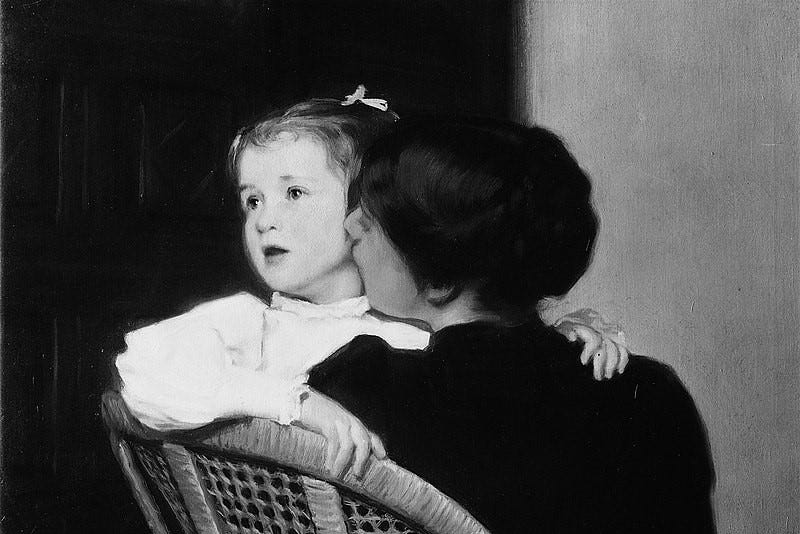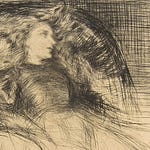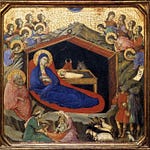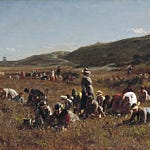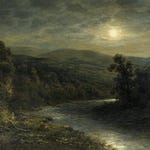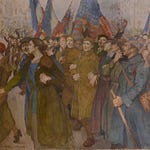Of the five senses, sight is surely the most mysterious and wondrous. Touch and taste depend on direct physical contact. Smell depends upon contact with chemicals borne through the air. Hearing depends upon sound waves, borne through some medium such as air or water or a solid body; whales sing to each other by sounds that travel many miles through the sea without dispersal. If you tried to shout on the moon — supposing you would not immediately black out and then die from the absence of all air and its pressure — you could not make any noise beyond what you’d hear internally through your body. Somebody standing in front of you wouldn’t hear a thing. But sight requires no direct contact and no medium. It does require light, the first of physical creatures God makes, in Genesis, but what is light? Not an easy question to answer, actually. A wave, a particle — but a particle with no mass, no weight; yet though it has no weight, a photon does have a velocity, and its track is bent by gravity. And what’s that? When I was a very little boy, around four years old, I told my cousins Bobby and Frankie, who were two or three years older than I was, that it was “gravity” that made things fall to the ground, and they laughed, because they’d never heard of it. I got my dander up and went home and wrote it down, recording for all future times that Bobby and Frankie didn’t know it, “but the kid who lives at 302 Spring Street knows.” That’s how I would refer to myself. Yet if you put ten great physicists in one room and asked them what gravity is, and gave them an hour to come up with an answer that does not just state the problem in different terms, you’d better make sure there are no breakables in there.
“What’s all that fightin’ in the barn, Pa? Moose and Buck argeyin’ about gravitrons again?” Ma’s been making pies, and her arms are floured to the elbows.
“Yup. Moose says they are, and Buck says they ain’t. Moose says they’s needed to tie up ol’ Max Planck and Einstein, an’ Buck says Moose can take his equations and stow ’em, he ain’t a-going to believe in a thing unless’n he can pick ’er up.” Pa spits out a chaw of tobacco into the garbage pail — chank. “Niver did see two such boys fer argeyin’. Wish they’d a-been sociologists instead.”
“Pa!” says Ma, in shock. “Don’t say sich a thing ever again!”
Our Word of the Week is the verb and not the noun: see. That’s even more mysterious than physical light. I’m not talking about the optic nerve here. The optic nerve doesn’t say, “I see there’s a full moon tonight.” It’s the mind that says that. Your computer program can’t say that, because the program doesn’t have a mind. It might simulate saying it, but there’s no more mind in it than there is in an old card catalogue in a library. We use the word see in a very broad sense, and that’s not just true of English. Sure, it’s common to have a word that refers to one of the senses refer also to understanding something. So we say that someone has discriminating taste. A detective sniffs things out; that’s the sense also behind the Latin sagax, wise, sagacious, as applied to hound-dogs. We can feel our way through a problem; and someone who knows how to deal with difficult people has the right touch. “Have you ever heard of the Tasmanian devil?” someone might ask, meaning not whether your ears have picked up any conversation about that animal, which is unlikely outside of Australia, but whether you have read anything about it. But we simply say, “I see,” when we mean, “I know,” “I understand,” “My eyes have been opened” — and it’s not clear to me which is the literal and which is the figurative. To see — with the mind, that is — may be the basic action, and seeing with the eyes but a subset of that.
I’ve sometimes wondered which I’d prefer: to go without sight? or to go without hearing? Honestly, I don’t know. I’ve had only one blind student in all my years as a teacher; quite a cheerful fellow indeed. How do you explain to someone born blind, what it is like to catch a message, so to speak, from something 93 million miles away, such as the sun? How does that work? The blind person’s horizons extend only as far as sound will travel without getting muddled up. But that’s only if we think of sight as a phenomenon of the eyes. Milton saw further into the heart of fallen man than did any poet of his time, and when he did that seeing, he was blind. I can tell you that pentagons are fascinating things to make spirals out of, but unless I show you why, and you follow along, you won’t see it, even if you take my word for it. Eighty years ago, in the town where we now live, they used to hold dances every Saturday night in the town hall; I know that that was a very good thing to do, especially when they did that, right in the middle of the second World War. But do I see it? Only from far away, in my imagination; like a glimmer of a world where I have never been, but where I might have been. Yet I do see.
Word & Song by Anthony Esolen is an online magazine devoted to reclaiming the good, the beautiful, and the true. We publish six essays each week, on words, classic hymns, poems, films, and popular songs, as well a weekly podcast for paid subscribers, alternately Poetry Aloud or Anthony Esolen Speaks. Paid subscribers also receive audio-enhanced posts and on-demand access to our full archive, and may add their comments to our posts and discussions. To support this project, please join us as a free or paid subscriber. We value all of our subscribers, and we thank you for reading Word and Song!



